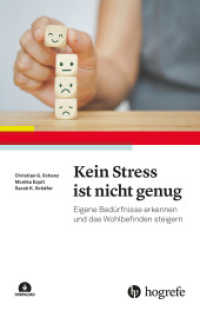Full Description
This book sheds light onto the complexities of diversity, equity, and inclusion (DEI) within Central and Eastern Europe (CEE) , a region rich in history and cultural variety, yet underrepresented in DEI studies. Focusing on DEI issues from a translocal perspective, it explores the interplay between historical legacies and contemporary challenges, examines DEI in the workplace, and addresses various intersectionalities of gender, sexuality, ethnicity, and ability in the context of CEE region.
Engaging with current debates on globalization, migration, nationalism, and the socio-political dynamics of inclusion and exclusion, this work brings regional specificities into broader scholarly and policy discussions. It also challenges the predominantly Western-centric discourse in DEI scholarship.
This volume will appeal to researchers in business as well as the social sciences seeking a deeper understanding of DEI within CEE, encouraging a nuanced approach to studying and addressing equity and inclusion in a region with a complex historical and contemporary landscape. It also enriches the global discourse on DEI, serving as a crucial resource for developing context-specific strategies to enhance inclusivity in Central and Eastern Europe.
Contents
The importance of being complex.- Why Central and Eastern Europe?.- Beyond Borders.- Tensions and Contradictions.- Our Standpoint as Editors.- Data and methods.- Attitudes and migration: Contemporary trends in Central and Eastern Europe.- Long-term changes in attitudes and migrant population in Central and Eastern Europe.- Methodology: narrative literature review.





